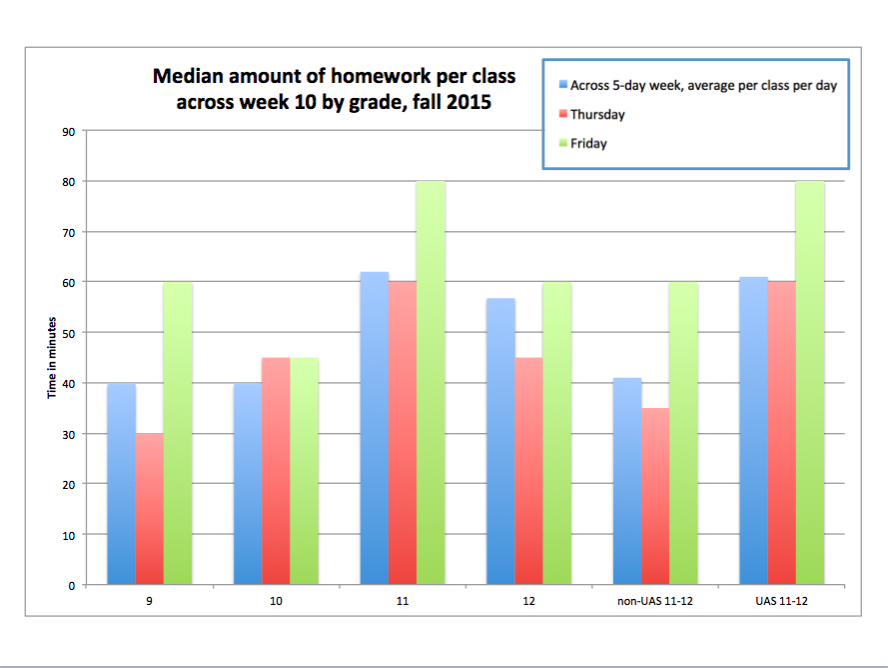Urban Looks to Change Homework Policy
Complaints of a stressful homework load are common at Urban, but soon this may change. The Urban faculty has recognized that having a homework load so overwhelming that it necessitates a “catch up day” is a big problem. Recently, Geoff Ruth, Academic Dean, sent out a series of surveys to the student body asking them to record how much time their homework takes. The results from the surveys will be used to create a new homework policy that will potentially decrease the amount of time spent on homework each night.
Ruth is partially in charge of creating a new homework policy. While it’s too early in the process for Ruth to release a set amount of time, the idea of the policy is to regulate the homework students are doing per class per night. In the past, homework time limits have been few and far between: “Some departments have developed a range, some departments haven’t, but even for the departments that have developed a range, it’s not communicated to students or parents,” Ruth said. “That’s one of the goals, to make [a guide for the amount of homework] more explicit, more transparent.”
The homework policy will not be one number for the whole school. There are a lot of different factors to consider. Ruth commented that the number range “will likely be differentiated by grade level.” Another big challenge is that, depending on their academic strengths and weaknesses, students can take a varying amount of time to do an assignment. “When we eventually land on a homework timeline,” Ruth said, “it’s important to think about the fact that that’s not going to be the same for everyone.” This means that if a student takes significantly more time, his or her homework is still going to take him or her longer than a faster student. The “goal is to get [the policy] in place by the end of the year,” said Ruth.
For some Urban students, a decrease in homework load is a necessity. It can be challenging to balance extracurriculars, commute time, and school work. For example, Grace Hagy (‘18) sees finding time for homework as extremely challenging: “I live in Half Moon Bay, so it’s … an hour and a half to get home … When I get home, I have four hours of gymnastics … , and then when I get home from that, I have to eat, and shower, and then I can start homework.” For Hagy, homework does not start until “10 or 11” at night.
Larkin Levine (‘17) told me homework is the reason she doesn’t do sports or other after school activities. “My homework takes a certain amount of time and I don’t allow after school activities to infringe on that time” she said.
Not all students live with these extremes, but many still find their homework hard to handle. Ana Gorski (‘18) said, “It’s been hard to find time for myself, with the bus ride [to Marin] and having four solids.”
Of course, there are students who don’t see Urban’s homework as an issue. Freshman Sophia Vahanvaty (‘19) says that for her, “The homework’s pretty manageable” and that even with four solids, says, “I usually don’t spend more than two-and-a-half to three hours” each night. Gorski found that “with the homework situation, [fall term] was pretty manageable.”
The students interviewed identified various different reasons for their motivation to complete their work; grades, parental approval, getting enough sleep, and strengthening understanding of concepts learned in class were motivators that came up often.
Students interviewed told of mixed experiences in getting the support they need from teachers. Skylar Baker (‘18) said, “If you take the initiative to go ask a teacher, they’ll give you the support you need.” However, Baker also made it clear that asking is essential. “You have to know when you need that support,” he said.
One issue that came up with interviewees was the subject of extensions. Hagy says that her schedule causes her to need extensions last minute, and often teachers fail to accommodate. “If I’m asking for an extension the night before,” she said, “I won’t get it.”
Urban teachers have concerns about being given a max amount of homework to assign. Ben Slater, English teacher, said, “I imagine having to shorten the readings, which actually really changes the curriculums” if a homework limit is put into place. Slater continued, “My doubts are that certain books I teach … are so long, I worry about being able to keep those.”
Scott Nelson, Math teacher, has his own concerns. “ A time-boundary policy focuses on process more than outcome and this can seem incompatible with outcome-based assessment and evaluation,” he said. Nelson continued, saying that a math recycle “is a situation where a time boundary could be in direct conflict with student performance on a graded assignment.”
However, teachers can also see advantages to students having less homework. Richard Lautze, Math teacher, said, “I think, overall, students should have less homework so that they can get involved with things outside of the academic day.”
On the other hand, Greg Monfils, English and History teacher, told me that he is “not sure” if this policy is necessary. Scott Nelson has his own personal homework policy. He said, “ I already use 45 minute time limit on homework, and only assign 3 per week (rather than 4 on a week when a class meets 4 times). I adjust lesson plans by giving some time for finishing and correcting HW in class or on a later homework assignment. ”


